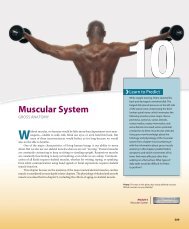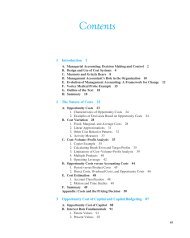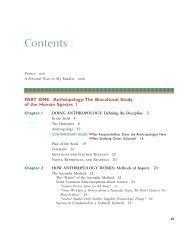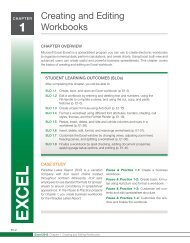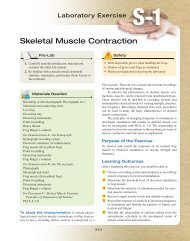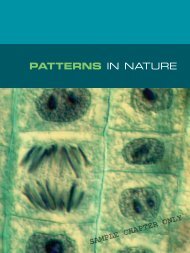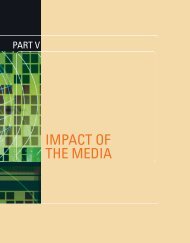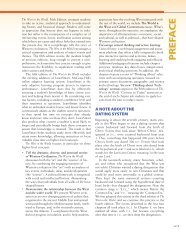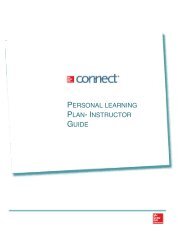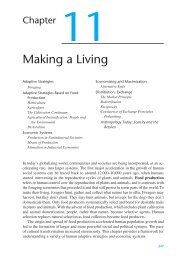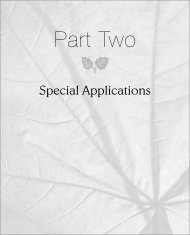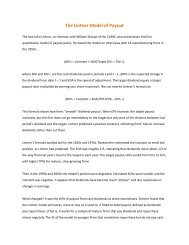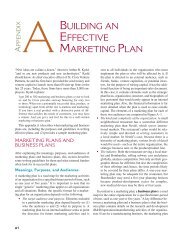La vie quotidienne et les loisirs
La vie quotidienne et les loisirs
La vie quotidienne et les loisirs
You also want an ePaper? Increase the reach of your titles
YUMPU automatically turns print PDFs into web optimized ePapers that Google loves.
96 | CHAPITRE 2 <strong>La</strong> <strong>vie</strong> <strong>quotidienne</strong> <strong>et</strong> <strong>les</strong> <strong>loisirs</strong><br />
2.5. This section continues the<br />
spiraled introduction of the verb +<br />
infi nitive construction, fi rst with pouvoir<br />
and vouloir, then with savoir.<br />
Before assigning as homework, do<br />
PF input that includes forms of the<br />
verbs used with infi nitives. Develop<br />
the conjugations yourself with examp<strong>les</strong><br />
from the board. Explain that<br />
je voudrais / j’aimerais are used<br />
as a matter of politeness. Clarify<br />
the difference in meaning b<strong>et</strong>ween<br />
j’aime + infi nitive and j’aimerais /<br />
je voudrais + infi nitive. You may<br />
want to refer students to Le verbe<br />
français sections in the Cahier.<br />
➤ vouloir = to want to<br />
Je veux manger.<br />
➤ pouvoir = can, be able<br />
to<br />
Tu peux sortir ce soir?<br />
➤ Negation:<br />
Je ne veux pas sortir.<br />
Je ne peux pas dormir.<br />
➤ savoir = to know<br />
(a fact)<br />
Je sais la réponse.<br />
ES 4. To practice savoir with<br />
nouns, assign partners and distribute<br />
two s<strong>et</strong>s of cards, one s<strong>et</strong> for<br />
Partner A and another for Partner<br />
B. Card A: mon âge, mon adresse,<br />
mon nom de famille, <strong>les</strong> formes du<br />
verbe aller, la date de l’examen;<br />
Card B: mon numéro de téléphone,<br />
la couleur de mes yeux, mon<br />
prénom, la date de l’anniversaire de<br />
ta mère, l’âge de ton père. Partners<br />
take turns asking questions such as<br />
Est-ce que tu sais mon adresse?<br />
Est-ce que tu sais l’âge de ton<br />
père?<br />
➤ savoir + infi nitive<br />
= to know how to (do<br />
som<strong>et</strong>hing) Je sais nager.<br />
Je ne sais pas danser.<br />
➤ je voudrais, j’aimerais<br />
= I would like (to)<br />
Je voudrais dormir<br />
maintenant!<br />
2.5 Abilities and desires: The verbs pouvoir,<br />
vouloir, and savoir<br />
A. To talk about what you can do or have permission to do, use pouvoir. Vouloir<br />
is used to indicate wishes or desires. These two irregular verbs are very similar<br />
in their conjugation patterns. Like aimer, they are often followed by an<br />
infinitive.<br />
pouvoir (to be able, can) vouloir (to want)<br />
je peux nous pouvons je veux nous voulons<br />
tu peux vous pouvez tu veux vous voulez<br />
il/elle/on peut ils/el<strong>les</strong> peuvent il/elle/on veut ils/el<strong>les</strong> veulent<br />
—Tu veux aller au cinéma ce soir? Do you want to go to the mo<strong>vie</strong>s<br />
tonight?<br />
—Je ne peux pas. Je suis fauché(e).<br />
I can’t. I’m broke .<br />
Pronunciation Hint<br />
peux/, peu/t, pouvõn/s/, pouvez/, peuve/n//t; veux/, veu/t, voulõn/s/, voulez/, veule/n//t<br />
B. Savoir is used to talk about knowing facts.<br />
—Tu sais la date d’aujourd’hui?<br />
—Non, je ne la sais pas.<br />
Pronunciation Hint<br />
sais/, sai/t, savõn/s/, savez/, save/n//t<br />
savoir (to know)<br />
je sais nous savons<br />
tu sais vous savez<br />
il/elle/on sait ils/el<strong>les</strong> savent<br />
Do you know the date today?<br />
No, I don’t know it .<br />
C. When savoir is used with an infinitive, it conveys the notion of knowing how<br />
to do som<strong>et</strong>hing.<br />
Je ne sais pas nager.<br />
Tu sais cuisiner, n’est-ce pas?<br />
ES 5. Hot potato. Display a list of predicates<br />
on OHP or board. Do as partner or smallgroup<br />
practice. É1 selects a verb from the<br />
list and asks a question<br />
with savoir. É2 replies with<br />
savoir and adds a new<br />
verb with vouloir. É1:—Estce<br />
que tu sais (nager)?<br />
—É2: Oui, je sais nager,<br />
mais je ne veux pas nager.<br />
Je veux jouer au tennis.<br />
Suggestions: cuisiner, jouer<br />
au tennis, jouer au bridge,<br />
faire du ski, danser, jouer<br />
du piano.<br />
I don’t know how to swim .<br />
You know how to cook, don’t you?<br />
D. Use je voudrais or j’aimerais instead of je veux to express a wish more politely.<br />
Other useful forms: tu voudrais; il/elle/on voudrait. (These are forms of the<br />
present conditional. For now, you need only recognize and use these forms in<br />
conversation.)



